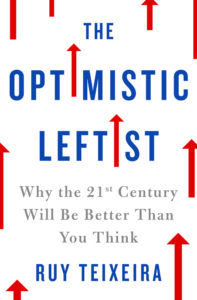by Ruy Teixeira
What is the left? Historically, the term goes back to the French Revolution, when those who supported the absolute monarchy sat on the right in the National Assembly and those who supported change sat on the left. Through many changes and permutations, these terms have stayed with us to the present day, with similar, if updated, connotations. .

The right today generally defends the class structure and economic outcomes of the current system (capitalism) as fair and efficient, sees traditional norms and social structures as fundamentally positive and does not believe that the scope of political and economic democracy needs to be expanded. The left generally believes the class structure and economic outcomes of the current system need to be significantly changed, sees traditional norms and social structures as negative constraints on human potential and does believe that the scope of political and economic democracy needs considerable expansion.
This is a pretty broad definition. But it is appropriate. There is no sound reason to confine one’s definition of the left to those who believe capitalism is fatally flawed and must be replaced with something different or those who believe, more generally, that the current system must be radically restructured to achieve any modicum of justice. Socialists and radicals may choose to conceptualize themselves as “the left,” categorizing those who believe significant reform within the system is both desirable and feasible as props to the system rathe r than part of the left. No one can stop them from doing so. But this is an arbitrary distinction we need not accept. Instead, the left should be defined on the basis of commitment to change, rather than on a single preferred strategy for achieving change.
r than part of the left. No one can stop them from doing so. But this is an arbitrary distinction we need not accept. Instead, the left should be defined on the basis of commitment to change, rather than on a single preferred strategy for achieving change.
Thus the left, broadly conceived, certainly includes socialists, social democrats and radicals, but also greens, liberals, progressives and generally left-of-center like the Italian and American Democrats. Defined in this way, how and where has the left succeeded historically? And by “success” I don’t mean struggled valiantly or had large demonstrations: where have they actually achieved reforms that made people’s lives better?
By and large, the left has achieved much more success when times were good than when times were bad. Hard economic times and rising in equality, rather than generating broad support for more democracy and social justice, more typically generate pessimism about the future and fear of change. In contrast, when times are good, when the economy is expanding and living standards are steadily rising for most of the population, people see better opportunities for themselves and are more inclined toward social generosity, tolerance and collective advance.
RUY TEIXEIRA is a Senior Fellow at the Center for American Progress and author or co-author of several books on American politics. Teixeira’s book, The Emerging Democratic Majority, written with John Judis (Scribner, 2002), was the most widely discussed political book of that year.
